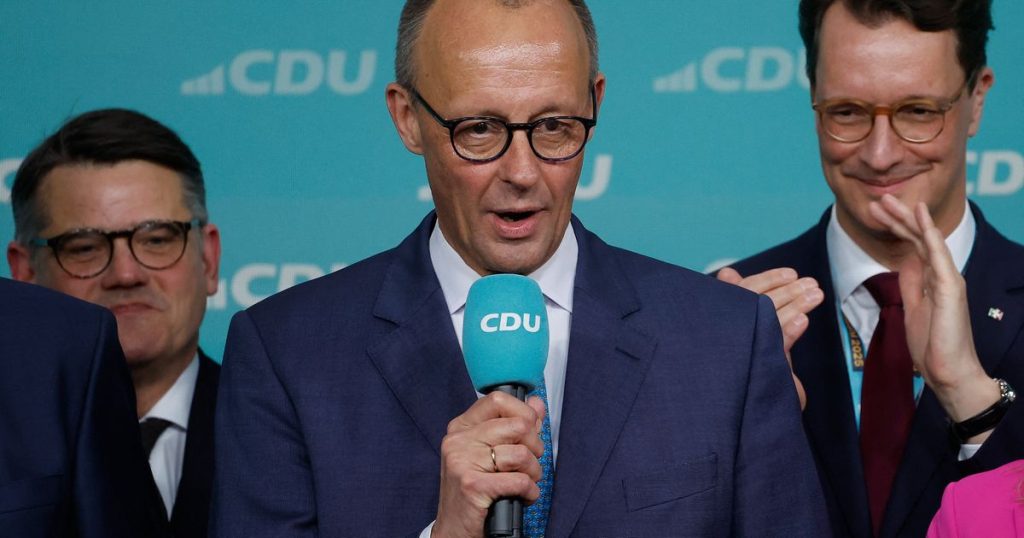The recent German national election has brought about significant shifts in the country’s political landscape, marking a turning point for both mainstream parties and the far-right. Provisional results confirmed that Friedrich Merz, a prominent figure in the conservative Christian Democrats, has emerged as the winner, positioning him to become Germany’s next leader. Merz’s victory comes amid a backdrop of economic stagnation and growing concerns over migration, issues that dominated the campaign and left many voters disillusioned with the status quo. The election also saw a dramatic surge for the far-right Alternative for Germany (AfD), which secured its best-ever results and became the second-largest party in the country. This outcome has sent shockwaves through Germany’s political establishment, as the AfD continues to challenge the dominance of mainstream parties despite being shunned by other political groups due to its radical stance on immigration and its ties to right-wing extremism.
The election results highlight the deepening divide within German society, as voters expressed frustration with the political elites and the ongoing challenges facing Europe’s largest economy. Merz’s Christian Democrats secured 208 seats in the 630-seat Bundestag, while the AfD claimed 152 seats, marking a significant milestone for the far-right party. The center-left Social Democrats (SDP), led by outgoing Chancellor Olaf Scholz, suffered a major setback, dropping to 120 seats. The Greens and the pro-business Free Democrats also lost ground, with the latter failing to cross the 5% threshold required to enter parliament. The Left party and the Sahra Wagenknecht Alliance, a new left-wing movement, managed to secure 64 seats and narrowly missed the threshold, respectively. These results underscore the fragmentation of Germany’s political landscape and the declining fortunes of the traditional center-left and center-right coalitions that have long dominated the country’s politics.
Merz, a seasoned politician and former opposition leader, has pledged to form a stable government by Easter at the latest, ruling out any cooperation with the AfD. Instead, he is likely to partner with the Social Democrats, who, despite their poor performance, remain a key player in German politics. Merz’s conservatives and the SDP together hold a majority in the Bundestag, providing a potential basis for a joint government. However, the partnership is expected to be challenging, given the significant ideological differences between the two parties and the lingering resentment over the collapse of the previous coalition. Scholz, who will remain in office as caretaker chancellor until a new government is formed, has already signaled his willingness to work with Merz, but the road ahead will be fraught with difficulties as the two sides navigate complex policy issues, including economic reforms, migration controls, and Germany’s role in Europe.
One of the most striking aspects of the election was the strong performance of the AfD, which has now firmly established itself as a major force in German politics. Despite being excluded from coalition talks by other parties and facing scrutiny over its ties to right-wing extremism, the AfD has capitalized on voter discontent, particularly in eastern Germany, where it has traditionally enjoyed strong support. The party’s success has raised concerns about the growing influence of far-right ideologies in a country still grappling with the legacy of its Nazi past. AfD leaders have already vowed to build on their success and aim to become the largest party in the next election. Their jubilant reaction to the results highlights the confidence within the party, which now sees itself as a key player in shaping Germany’s political future.
Merz, meanwhile, has struck a determined tone, emphasizing the need for European unity in the face of growing external pressures. He has pointed to interventions by U.S. figures, including Elon Musk and JD Vance, who openly supported the AfD during the campaign, as evidence of the challenges Germany and Europe face from both the U.S. and Russia. Merz has made it clear that his top priority is to strengthen European solidarity, particularly in light of the ongoing conflict in Ukraine and the increasingly confrontational foreign and trade policies of the Trump administration. Germany, as the most populous member of the European Union and a leading contributor to NATO, will play a pivotal role in shaping the continent’s response to these challenges. Merz’s call for unity resonates with many Europeans who are wary of being caught in the crossfire of great power rivalries.
As Germany navigates this uncertain period, the next four years will be critical in determining the direction of the country and its role in Europe. The formation of a new government, likely led by Merz and supported by the Social Democrats, will face numerous challenges, from reviving the economy to addressing the deep-seated concerns of voters who feel neglected by the political establishment. The rise of the AfD serves as a stark reminder of the polarization within German society and the need for mainstream parties to address the issues that have fueled the far-right’s growth. While Merz has promised to restore stability and unity, the road ahead will be difficult, and the success of his government will depend on its ability to deliver on key promises and rebuild trust with a disillusioned electorate. The election results have set the stage for a new chapter in German politics, one that will be shaped by both internal challenges and external pressures, with the future of Europe hanging in the balance.









